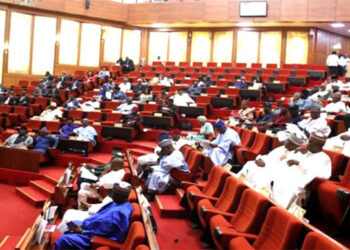The Senate Committee on Gas Resources probing the N135bn Central Bank of Nigeria intervention funds to some firms in the oil and gas sector , has threatened to involve the anti-graft agencies to recover the money from defaulting beneficiaries.
The panel gave the threat when the affected companies, numbering 14, appeared before it on Thursday to defend the utilisation of the loans they collected.
The members described as unacceptable, the fact that there was no synergy between the Ministry of Petroleum Resources and the CBN on the project.
They also queried the discrinatory disbursement of the funds to the beneficiaries and wondered why some firms collected more than the N10bn credit limit.
The Chairman of the Committee, Senator Agom Jarigbe, collected the records of the beneficiaries and the locations of their project sites for immediate investigations.
Speaking at the investigative hearing, Jarigbe lamented that the funds released under the gas expansion and intervention fund were inappropriately accessed.
He said, “The task of the committee is to ensure that the companies actually expended the funds on what they collected it for.
“The observation of the committee is that there are inconsistencies in the process and the committee may not hesitate to involve the Economic and Financial Crimes Commission to recover the funds.
“Some of the beneficiaries did not follow the guidelines. For instance, the ministry of petroleum resources is not even aware that the funds had been released.
“The guidelines stated clearly without ambiguity that they are supposed to do evaluation at the ministry before the list of the qualified ones would be sent to the CBN for them to access the loans but that was not done properly.
“We have also discovered that some of the companies does not have anything on ground since they got the loan.
“The committee would investigate all the observations and work on them and let Nigerians know the true position of things,” Jarigbe added.
However, the Legal Adviser to one of the beneficiaries, Lee Engineering and Construction Company, Mathew Agbadon, told the committee complained to that the publication made by the committee had put the firm in a negative perspective.
He said, “There has been a fundamental misconception out there in the public domain that some people just leverage on the CBN money, stole it and went away.
“That is far from the truth. The truth of the he matter is that as a beneficiary of that scheme, we had business with the commercial bank.
“The discussion was done at the commercial bank level and due diligence was done and our application was approved.
“Based on the application we accessed the facility as an organization.
“Lee Engineering has been in the oil and gas industry for 32 years with over 4, 000 employees.
“This particular project is one of the outfits of Lee Engineering and it is located Warri, Delta State.
“If the Committee is ready to visit the project today, we are ready for it. It is 90 per cent completed.
“It is billed for commissioning in the first quarter of next year. In fact we are looking forward to President Bola Tinubu to commission the project being the first of its kind in this part of the World.”
The Ministry in 2021 initiated the National Gas Expansion Programme (NGEP) to encourage domestic utilization of gas in the country.
The Director of Gas in the Ministry, Oluremi Komolafe told the Committee that the Ministry was not aware of the disbursement of the fund despite the fact that it partnered with the CBN on the scheme.
She added that 150 applications were received, and that 69 companies were recommended and presently 16 applications are being processed.
She said none of the firms whose applications were being being processed made the list of the beneficiaries of the scheme.
Some of the firms that claimed that they had no business with either the ministry or the CBN were rebuked by the committee.
They argued that the beneficiary got a single digit interest rate from the commercial banks because it was part of the conditions to access the loans.




